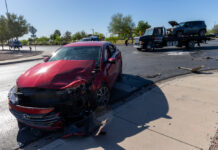The Maricopa Unified School District is getting ready to invest in a new science curriculum.
The district is evaluating potential vendors to provide both curriculum and textbooks to all the district’s K-12 schools at a cost of about $1.7 million.
According to the district, the Teaching and Learning department is responsible for the adoption process, which starts with teachers voting on the curriculum, followed by Governing Board approval, purchase of the materials and delivery, which will come in time for the start of the 2021-22 school year.
Student achievement data will be reviewed each semester using benchmark data and yearly using state assessment data.
Wade Watson, the district’s director of curriculum and instruction, made a presentation at Tuesday’s MUSD governing board meeting outlining the process of evaluating and selecting a vendor (or vendors) to provide the new science curriculum. He said it has been a long time coming, as the science curriculum was last updated 14 years ago.
“We were fortunate to be able to adopt a new math curriculum in 2017, and in 2018 we did an English language arts adoption and again replaced curriculum that was over 14 years old,” he said. “Since that time we’ve been looking forward to a science adoption, but we had to wait for the new Arizona science standards to get formally approved, which took a while. Once those were approved, we needed to let the textbook companies have a chance to update their materials to ensure they aligned with the new state standards which brings us to where we are now.”
The district is evaluating the three major national providers of curricula and textbooks: McGraw-Hill, the current English language arts provider; Savvas, formerly Pearson, the current math provider; and Houghton Mifflin Harcourt, which also provides curriculum and textbooks to the district.
Watson said that as part seeking a new textbook provider, teachers get online demo accounts to review the materials and hard copies are provided to each school site.
He said the new materials are crucial for the district to meet the statewide testing standards.
“The state standards change,” he said. “And as they change, we need to update our resources and our curriculum and textbooks to meet those standards so that our teachers are able to teach to the curriculum and the students are able to learn.”
MUSD is seeking input from multiple sources in the review and selection process, Watson added. The science textbooks preview will involve teachers, administrators and the community. As part of that process, preview materials available at each school and public comment and input is actively sought.
“We posted on our website in December that any community member who wanted to review the materials could make an appointment with their student’s home school to come in and review the materials and provide feedback,” he said.
Once all constituencies have had a chance to provide feedback and the vendors have had a chance to respond to it, the teachers then score the curriculum on a rubric covering a series of criteria that align with adoption rules and regulations and procurement regulations. The teacher scoring is almost complete.
One selections are made and purchased, delivery will be scheduled before the start of 2021-22 school year. In May, formal adoption information will be given to the board.
Board vice president AnnaMarie Knorr emphasized the importance of parental review of the curriculum.
“It is really important for a lot of reasons,” she said. “What I typically find with parents is that they will say, ‘I don’t send my kids to public schools because they teach that and we’re not going there because they do this.’ There’s no blanket instruction going on statewide or nationwide.”
Informing parents that a new curriculum is under consideration and that they can have input on the selection can help dispel the myth of what’s being taught and not being taught, Knorr said.
Board member Torri Anderson, a former teacher, shared her excitement to acquire the new resources and emphasized the need for community input.
“I am so excited for us to get new curriculum,” she said. “I want to put a shout out to parents to please, please make an appointment with your principal to see this curriculum. This is important to our growth as a district. I’m excited because I think it’s such an amazing opportunity, and it’s one more way we are achieving our strategic plan.”
Board president Ben Owens asked if multiple vendors could be selected, especially at the secondary level as the curricula are more specific. Yes, Watson replied, noting the district could have one vendor provide K-6 curriculum, while another might provide high school biology and a third might provide middle school chemistry curriculum and texts.
Each level is evaluated separately, which leaves the door open to multiple vendors and the district choosing which is best at each level, Watson said.





![Shred-A-Thon to take place tomorrow An image of shredded paper. [Pixabay]](https://www.inmaricopa.com/wp-content/uploads/2024/03/shredded-paper-168650_1280-218x150.jpg)












![Shred-A-Thon to take place tomorrow An image of shredded paper. [Pixabay]](https://www.inmaricopa.com/wp-content/uploads/2024/03/shredded-paper-168650_1280-100x70.jpg)